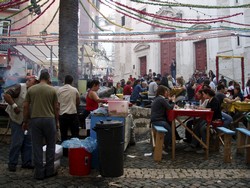The important role public space plays in intercultural cities
With international migration increasingly becoming an urban phenomenon, public space is where encounters, competition and conflicts involving individuals, groups and communities become most evident. The SHARINGSPACE (Intercultural cities and collective space) project coordinated an international exchange of 30 researchers from different disciplines who were seconded to partner institutions. This supported scientific exchange and knowledge transfer. Project fellows and visiting scholars shared and developed theoretical and methodological skills as well as operational tools to analyse the complexity of contemporary migration processes. Site visits and meetings with municipal departments and local actors afforded opportunities to experience first-hand innovative approaches to the issue of public space and migrants. Research focused on the European cities of Lisbon and Venice and, further afield, Buenos Aires, Johannesburg and Mexico City. The comparative perspective contributed to a better understanding of the characteristics of international migration, the factors shaping migration policies in these cities and the main issues at stake. Each city's specific conditions affect the type of actions they take, and SHARINGSPACE found that Lisbon and Venice have faced most of the international migration predicaments that Buenos Aires, Johannesburg and Mexico City are expected to experience. Conferences and seminars (with academics, policymakers, practitioners and civil society at large) helped to foster debate on the crucial role that public space plays in shaping urban residents' sense of belonging and citizenship. Academic lectures (for graduate, Masters and PhD students) offered a forum for exploring the place public space holds in making contemporary and ever-more culturally diverse cities more (or less) inclusive. SHARINGSPACE also organised various public events in partnering cities to raise public awareness and helped make public space a more central issue in the urban debate. Project activities have driven the work of partner research centres on the issue of public space and social cohesion in the framework of burgeoning international migration. The research has afforded a greatly enhanced understanding of the nexus between international migrants and urban space.



